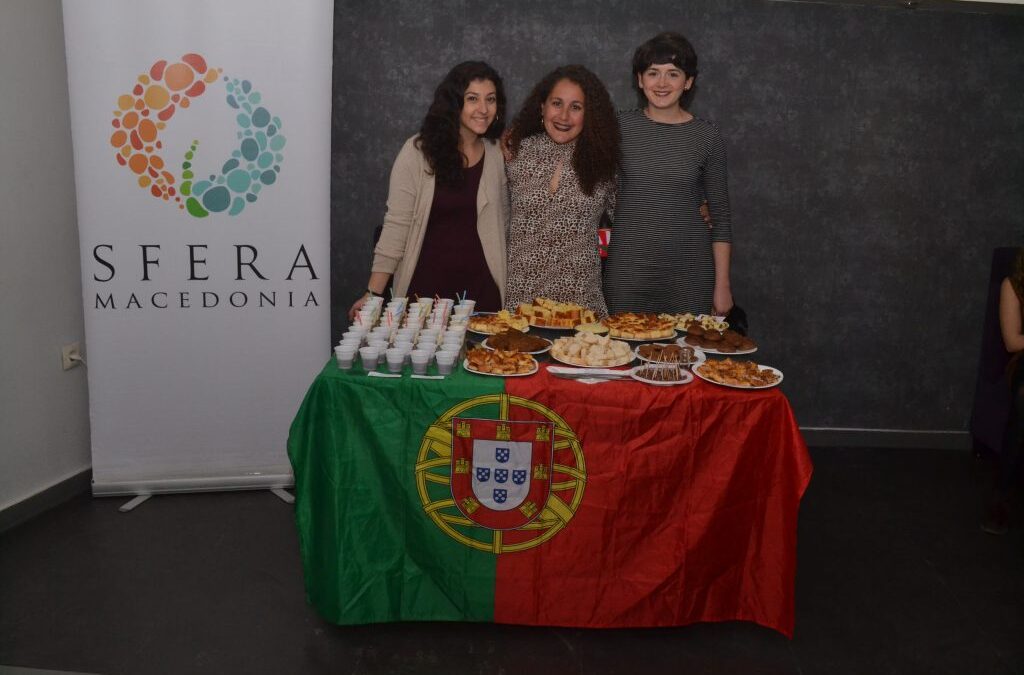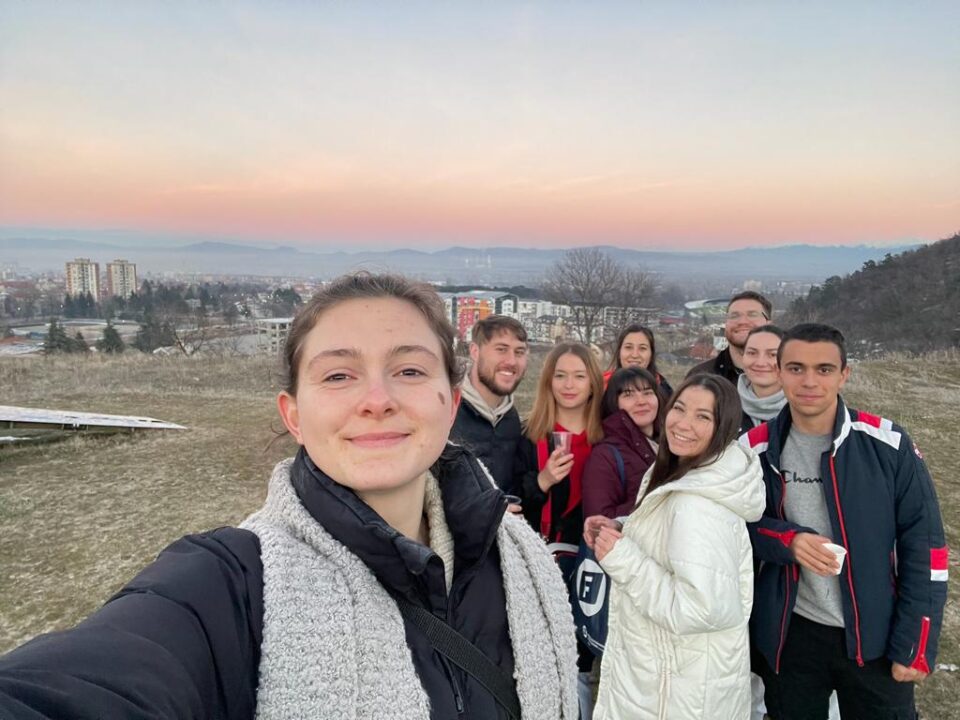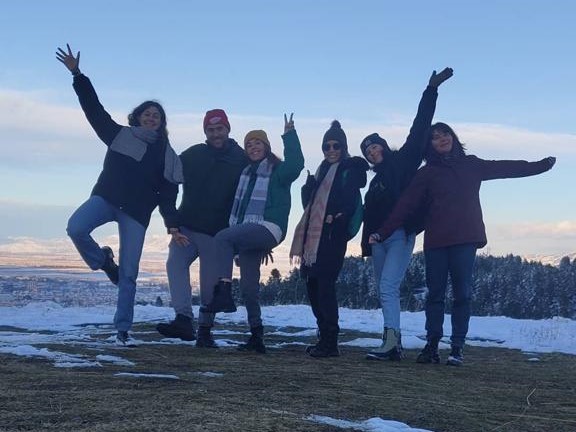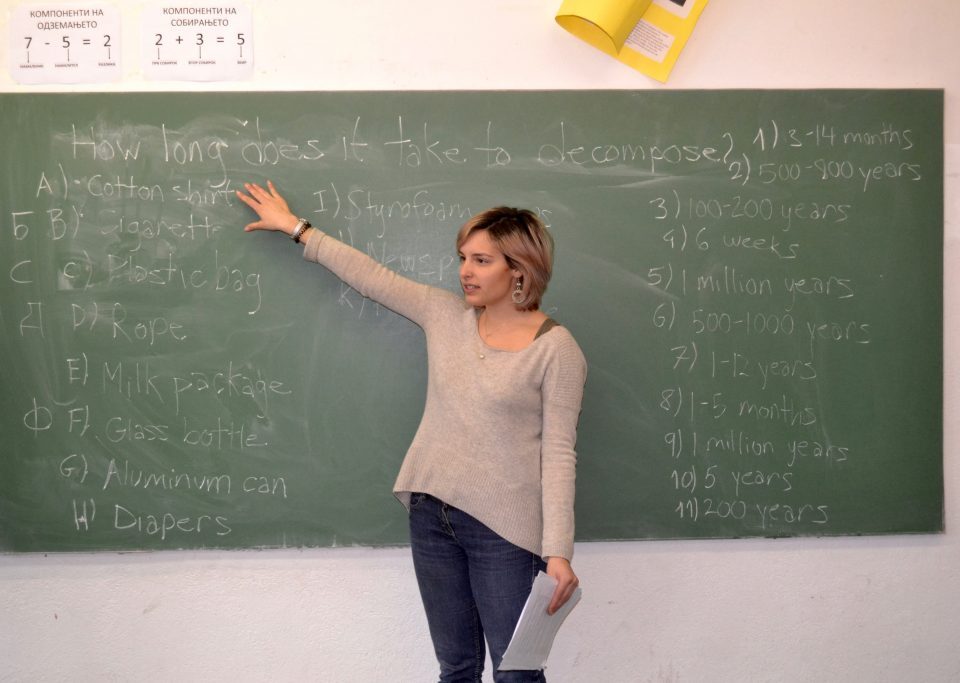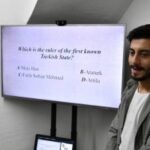
Cemal Erdem

Comparison of Cultures – Esra Gullu
My name is Diva Carvalho, and I’m a 24-year-old Portuguese girl from the island of Madeira.
Now that my short-term European Voluntary Service here in Bitola, North Macedonia, is coming to an end, it is easier for me to just sit back and reflect on my two months and all that I’ve achieved.
It had always been my wish to participate in a European Voluntary Service project ever since I did Erasmus for five months in the Czech Republic and started to participate in youth exchange projects. I didn’t have the opportunity to do it earlier because I was still doing my bachelor’s degree at the time, but now that I’m in the last year of my master’s degree and writing my thesis, I’ve found that it was the right time to do it.
When I found out that the organization SFERA Macedonia, through the sending organization Teatro Metaphora, was looking for volunteers for their project “Green Raid,” it just seemed like the perfect thing to do. I have been a scout for ten years now, and because of that, I’m really into nature and environment-related projects—anything that can lead me to do some volunteer work. That was one of the reasons, but another was that on my island, Madeira, in 2010, we had massive floods that destroyed many houses and agricultural fields, and people died. Besides that, in the summer of 2016, we had several wildfires that burned lots of trees and completely ruined many houses and buildings in the city center, and some people died. Because of that, and knowing that some similar disasters happened in North Macedonia, meaning that the project would have an aspect geared towards raising awareness about that topic, it made me want to be part of it even more.
I arrived in Bitola to start my EVS on the last day of January, and on the first day of February, I got to know the team that I would work with. I met Milcho, Mende, and Imma, who are currently responsible for the organization SFERA Macedonia, and Beatriz and Belinda, the other two Portuguese girls with whom I would have to work on the same project. A month later, Sehrazat, a Turkish girl, arrived, and while she had her own project, we tried to work together and help each other.
The office, where I spent most of my working hours, had a relaxed and informal environment. Everyone did their job, and we would talk and have a good time while working. Our schedule was flexible, but mainly we worked from 10 a.m. to 3 p.m. during the weekdays, either inside the office to prepare the materials for our tasks or outside. In case I needed something, and even the girls could, we could always count on our mentors and colleagues to get it done. That made my job a lot easier.
During the two months, we embraced various projects and tried to do as many things as possible. We had our own tasks, but we helped SFERA with their own projects. Every week we prepare a workshop on the prevention of natural disasters (wildfires, floods, and earthquakes) to provide the community with more information on how to proceed in case one of those disasters happens. To add to those workshops, we created informational flyers with the main topics and gave them to the people on the main pedestrian street in Bitola. Also, we gave Portuguese lessons twice a week to a group of people who always showed up interested and motivated to learn aspects of our culture and language. Since we didn’t have much time to teach them everything, we tried to give them the basics of the language and interesting facts about Portugal. This was the task that gave me more satisfaction to be part of since I was able to receive the feedback and see how much they learned and enjoyed it. Besides that, we made posters to promote our events and SFERA’s, and we had a full week to create our own activities. There was a movie night, a board game night, and an environmental cleaning day where people could join us and go to clean one of the parks in the city.
Having to prepare activities, flyers, and workshops and be part of some of the projects that SFERA had going on helped me gain some new skills and improve others. Thanks to the fact that I had to create flyers, and since I was never really good with these kinds of things, it made me improve my creative side. For the Portuguese lessons, we had to plan in advance, prepare the materials, and be able to stay in front of a class talking and teaching them everything. Thanks to that, I improved my English and even my mother tongue, and I became more comfortable talking in front of people. In addition, I became better at planning things for myself.
Talking about my experience wouldn’t be the same if I didn’t talk about the Macedonian culture and its differences from what I’m used to. When I arrived in North Macedonia, I quickly realized that people here don’t speak English very often, so I knew it would be a problem when I needed to get somewhere or do something on my own. The cold… It had a big impact on me because I wasn’t used to it, and while the weather is getting warmer now (it’s spring! ), when I first arrived here the temperature was in the negatives, which would have made me want to stay inside all the time (even if I didn’t, that’s what I wanted to do). The way the locals look at marriage, family, or even their beliefs in some superstitions is completely different from what we do. They believe in “promaja,” which is “a mystical force of nature responsible for the illnesses and deaths of millions of Balkan people throughout history,” and while for me it is a really weird superstition, for them it is something real. One thing I noticed too, through trying to do new things, is that people here don’t embrace different things. Once we tried to do a game night with games that they didn’t know, and they would always say that it was weird. When we said that we would be giving Portuguese lessons, they said it was unnecessary. Despite that, we did our job, and I’m proud of the results.
Bitola is the city where I’m staying, and it is the second-biggest city in the country. I enjoyed most of the moments that I had here, from the lovely dinners to my walks in the park, where I could enjoy myself and be surrounded by nature. It was two full months filled with new people and places, different points of view, ideas, work, friendship, laughs, and just everything that makes a new experience worth a little more. Despite being a small city, I felt good here, and I could even find some similarities to my culture back home, such as the habit of going to a coffee shop and staying there, even though we don’t sit there as much as they do. And the habit of being late… Despite having it and being known for it, Macedonians are notoriously late for everything—a fact that I dislike when we have workshops. Their food is different, but good! I had the opportunity to try homemade ajvar, a traditional relish made mainly of red peppers, and I loved it. I’m even taking it back home to give to my family. Besides that, I had the chance to go to some restaurants that have good traditional food too, like Bure, for example, with their melted cheese!
Being here has given me the opportunity to travel to different countries that I probably wouldn’t have visited if I were back in Portugal. It even gave me the chance to get to know North Macedonia and its lovely cities, Ohrid being my favorite. It’s a dreamy lake city with a fantastic atmosphere—everything I could ask for. While there, I visited Sofia, Bulgaria; Athens and Thessaloniki in Greece; and Limassol in Cyprus. Obviously, I had a great time in all of those places, but who wouldn’t? I feel grateful for this wonderful opportunity.
This short-term EVS gave me the tools to accomplish many of my goals and expectations. For all of the small and big things that I expected to improve, I feel that I achieved them. I got out of my comfort zone, improved my social, language, and flexibility skills, and was able to feel that I did a good job. It was really important for me to come here because I felt like I needed to do something different, something for myself, and maybe have some impact on others’ lives. I was in need of some changes, and I saw in this EVS a chance to do that.
The whole experience was truly amazing. Doing a European Voluntary Service is always a good idea if you want to get out of your comfort zone and be able to do something that will be an addition to your knowledge and character, and will for sure lead you to improve many of your skills, gain new ones and do things that you wouldn’t imagine yourself doing. I think that to start with these kinds of projects, a short-term one is always the better decision to go for. After that, and if you feel like you could do it for a longer period, then you should apply for a long-term EVS. As a tool for social inclusion and active citizenship, I could not be happier with the opportunity that EVS gave me.
Diva Carvalho

